New science finds we are on the path to a mass extinction of life in the ocean. From Princeton, Dr. Justin Penn explains The Great Dying, with his paper “Avoiding ocean mass extinction from climate warming”. Then from Australia, Dr. Blanche Verlie “Learning to Live with Climate Change – From Anxiety to Transformation”. Climate is not what you think.
Listen to or download this Radio Ecoshock show in CD Quality (57 MB) or Lo-Fi (17 MB)
WE CANNOT UNDERSTAND WHAT IS HAPPENING
Do you ever feel like you don’t know what is going on in the world? The news spins up so fast, and things we thought so solid are broken in a day, like women’s rights. Allegedly, there are more brain cells in one human than stars in the galaxy. There are almost 8 billion such minds, operating in Earth systems too complex to comprehend. No wonder we cannot comprehend reality. In her book “The Origins of Totalitarianism”, famous author Hannah Arendt said:
“We might not be capable of understanding ever again, that is, of thinking and expressing things that we are yet capable of doing.”
But we can see through a glass darkly. Science aids our perception and judgment of reality. But once you know this fossil civilization is a one-way ticket to oblivion, what now?
As broadcast in our April 20 show, knowing what they know, more and more scientists are breaking out to rebel. Here is a clip from the April 2022 arrest of NASA climate scientist Peter Kalmus. Peter chained himself to the door of the JPMorgan Chase Bank in downtown Los Angles. Chase is known to be the worst bank for funding fossil fuels in the world, lending out a third of a trillion dollars for oil, gas, and coal in the last five years. There is no defending climate while that torrent of money pushes more greenhouse gases into the sky.
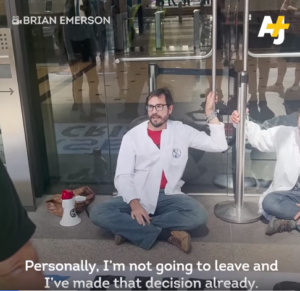
As reported on greenmatters.com: “Chase Bank is known as the worst fossil fuel bank in the world. According to Vox, in 2021, Chase spent $51.3 billion on financing fossil fuels in 2020; from 2016 and 2020, Chase spent $317 billion on fossil fuels.”
In the show, I play another clip of scientists at the April 2022 Rebellion in Sydney Australia.
===================================
CAN YOU HELP RADIO ECOSHOCK? Donations have been low and slow in the past 3 months. I’m not sure why, but I hear the same from a number of others, including non-profit groups and alternative media. Part of it is stress of higher prices hitting people’s ability to donate. It costs a little money to produce this program every week, and a little more to get it distributed to 106 radio stations – plus free downloads here on the blog and more. Can you help, even a bit? Or a lot? This would be a good time, please help if you can.
====================================
JUSTIN PENN
AVOID MASS EXTINCTION IN OCEAN LIFE
Science discovers wonders in the universe, but sometimes horrors here on Earth. About 251 million years ago, up to 90% of living things in the ocean died off. We call it the “Great Dying” and global warming did it. Scientists estimate the world warmed about 10 degrees C in that mass extinction event. On our current course of business as usual, new science shows, mass die-off in the seas is likely to happen again!
The new paper published April 28 is titled “Avoiding ocean mass extinction from climate warming“. The young lead author is Justin L. Penn. He began this research as part of a team at University of Washington with co-author Curtis Deutch. Justin is now an Associate Research Scholar, at Princeton.
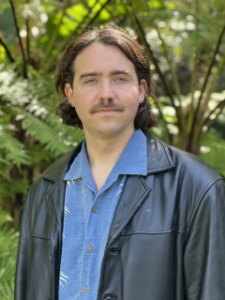
Dr. Justin Penn, Princeton
In 2021, humans again set another record high for greenhouse gas emissions. Many economies are sizzling. Scientists on this program project that business-as-usual fossil fuel burning could make the planet 5 degrees C hotter by year 2100. Is that enough to trigger a mass die off of life in the world’s oceans?
Listen to or download my 23 minute interview with Justin Penn in CD Quality or Lo-Fi
The authors build on two key needs for animals in the sea: their heat limits, and need for oxygen. Both are changing with the atmosphere above the sea. They call these two key requirements “ecophysiological” tolerances. They can test limits that lead to extinction (slow or fast) by checking against five previous climate-related extinction, including “the Great Dying” at the end of the Permian period, around 251 million years ago.
The authors find:
“Polar species are at highest risk of extinction, but local biological richness declines more in the tropics.
Reversing greenhouse gas emissions trends would diminish extinction risks by more than 70%, preserving marine biodiversity accumulated over the past ~50 million years of evolutionary history.”
It sounds like species that can move, would move toward the Poles. But then they reach a boundary for their needs, and expire. But for species already adapted to the cold seas nearer the Poles, there is no cooler place to go. Those that cannot adapt to warming temperatures (especially on the geologically sort time of human warming) – go extinct. They can find no home.
This new paper notes things like marine heat waves are not included. But that is exactly what is killing off coral reefs needed for so many marine species. Isn’t it likely that the speed of carbon build-up in the atmosphere this time could create disruptions never seen before in the fossil record? I ask Justin about this.
On this program, we tend to track threats to the world food supply – things like crop failures caused by heat and drought. Looking at Figure 2 in this new paper led by Justin Penn, the most productive food fisheries of the world are also threatened by extreme global warming.
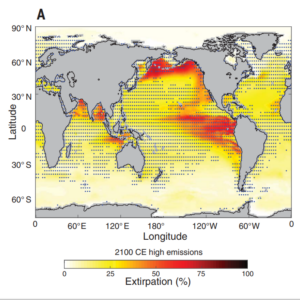
The paper says:
“Vulnerable regions include highly productive ecosystems where background O2 is already low, such as the north Pacific, eastern boundary upwelling systems, and the tropical Indo-Pacific (Fig. 2A). These regions are also home to many of the world’s most productive fisheries, which supply ~17% of humanity’s dietary protein.” (Shown is Figure 2A, Penn et al.) “Extirpation” is not the same as extinction, although it may be part of that process. A species that is forced to move from it’s native location is “extirpated”. Some may be able to move and survive elsewhere.
NOT TOO LATE, THEY SAY
The paper says:
“However, it is not too late to enact the reductions in greenhouse gas emissions needed to avoid a major extinction event. The low-emissions scenario assumes that declines began around 2020 CE and continue thereafter.”
But greenhouse gas emissions did not decline by 2020, and were still rising to record levels in 2021, with more high emissions expected in 2022. When is it too late? Even if we manage to control the scourge of overfishing (we haven’t), and marine pollution (still raging) – those conservation efforts will fail to stop a mass marine extinction if greenhouse gases go in the medium or worst case scenarios. It also means protected marine parks become less meaningful, if the species protected have to migrate somewhere else to survive, if they can.
MORE RESOURCES:
Justin Penn’s personal web site is here.
Your can find a special perspective on this ocean extinction (possibility) news in another article in Science: “A stark future for ocean life” by Malin L. Pinsky And Alexa Fredston published 28 Apr 2022. Their article is behind a paywall, but the free Abstract is helpful.
Here is one quote from that Perspective by Pinsky and Fredston:
“The authors [Penn et al] found that under ‘business as usual’ global temperature increases, marine ecosystems planet-wide are likely to experience mass extinctions potentially rivaling the size and severity of the end-Permian extinction – the ‘Great Dying’ – which occurred roughly 250 million years ago and led to the demise of more than two-thirds of marine animals.”
SEE ALSO: this helpful article in the Guardian newspaper (free).
======================================
BLANCHE VERLIE – CLIMATE TRANSFORMATION
Continuing climate disasters mean failure. Humans still fail to grasp the catastrophe we are making. Somewhere along the line, the adults got the story of reality wrong. We need to re-examine who we are, and learn to live during the great shift in everything.
This is the perfect time to connect with Dr. Blanche Verlie. She is a Postdoctoral Research Fellow at the Sydney Environment Institute, at the University of Sydney. Blanche is author of “Learning to Live with Climate Change, From Anxiety to Transformation.” She wrote the book after the horrendous Australian bushfires known as “Black Summer”.
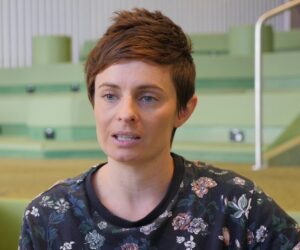
Dr. Blanche Verlie, University of Sydney
Listen to or download my 33 minute interview with Blanche Verlie in CD Quality or Lo-Fi
INTRODUCING BLANCHE VERLIE “Learning to Live with Climate Change”
Maybe we don’t understand what climate change is. Our guest is Dr. Blanche Verlie. Her book is “Learning to Live with Climate Change, From Anxiety to Transformation”. To help prepare us, we go a bit from her 2019 article in The Conversation, titled : “The terror of climate change is transforming young people’s identity”, where Blanche makes a more public explanation of her PhD Thesis.
SIX SILENT LIES CHALLENGED BY CLIMATE ACTIVISM:
In The Conversation, Blanche writes :
“Climate change challenges the beliefs that:
* humans are, or can be, separate from the non-human world
*individual humans have significant control over the world and their lives
*if you work hard, you will have a bright future
* your elected representatives care about you
* adults generally have children’s best interests at heart and can or will act in accordance with that
* if you want to be a “good person” you as an individual can simply choose to act ethically.
Faced with these challenges, it can seem easier in the short term to turn away than to try to respond. But the short term is not an option for young people.”
Striking students’ signs proclaim “no graduation on a dead planet” and “we won’t die of old age, we will die from climate change”. This is not hyperbole but a genuine engagement with what climate change means for their lives, as well as their deaths.
They know certain possibilities have already been stolen from them by the older generations. Rather than trying to hold onto dominant cultural narratives about their future, striking students are letting them go and crafting alternatives. “
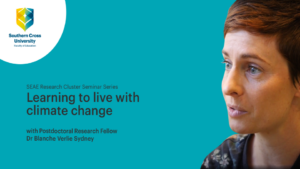
TO KNOW CLIMATE CHANGE IS REAL – BUT TO LIVE AS THOUGH IT IS NOT…
In that Conversation article Blanche says:
“My research investigates how young people’s sense of self, identity, and existence is being fundamentally altered by climate change.” and “many Australian adults have been living what sociologist Kari Norgaard terms a ’double reality’: explicitly acknowledging that climate change is real, while continuing to live as though it is not.”
FOUR PRINCIPLES OF NEW CLIMATE UNDERSTANDING
How can we understand climate change as a reality? In the program I read out “the four principles of new climate understanding”, from the book “Learning to Live with Climate Change” by Blanche Verlie.
“Common to such approaches, and thus to this book’s philosophy of climate as living-with, are four key interdependent notions.
The first is about interconnection, entanglement or relationality: that to exist is to be composed, and continually re-composed, through relationships with others, and that climate is not an object so much as a patterned ‘set of relations.’
Second, these relationships are always more-than human: we cannot escape our entanglement with climate and the wider ecological world. Relatedly, it is not just humans that change climate; non-humans also participate in creating, stabilising and changing climate, although this does not discount the significance of the changes being wrought by some human systems in this geological moment.
Third, climate is embodied, and all earthly beings are viscerally enmeshed with climate; indeed, we become (with) climate.
Fourth, climatic phenomena are inherently affective: they are energies, forces, intensities, feelings. Collectively, these principles articulate climate as ‘a living phenomenon’ that emerges from the interactions and relationships between all bodies: human, non-human and ‘inanimate’; living, dead, ancient and yet to come.”
Those four principles come from our guest, Dr. Blanche Verlie, from the University of Sydney in Australia.
A TEASER FOR VERLIE’S BOOK
The publisher writes:
“Learning to Live with Climate Change explores the cultural, interpersonal and sociological dimensions of ecological distress. The book engages with Australia’s 2019/2020 ‘Black Summer’ of bushfires and smoke, undergraduate students’ experiences of climate change, and contemporary activist movements such as the youth strikes for climate.
Verlie outlines how we can collectively attune to, live with, and respond to the unsettling realities of climate collapse while counteracting domineering ideals of ‘climate control.’”
Blanche is a climate activist – she volunteers with the group “Climate for Change”.
TOO DISTURBING TO TALK ABOUT
Found in the Verlie book, this wonderful paragraph:
“Kari Norgaard argues that if we acknowledge that climate change is ‘too disturbing to be fully absorbed or integrated into daily life’ [pause] then denial and apathy can ‘be understood as testament to our human capacity for empathy, compassion, [ – ] and an underlying sense of moral imperative to respond, even as we fail to do so.’”
But is that a pardon for our failure – to find a biologically sane way to organize society?
OUR VIOLENCE TO OURSELVES
From the book “Learning to Live with Climate Change”:
“Appreciating our intimate relationality with climate change is therefore deeply distressing. Understanding climate as living-with acknowledges we can and do feel violences inflicted on the atmosphere and broader planetary relations in our own bodies, as these violences are also inflicted, in some ways, on ourselves.
For example, in the undergraduate class on climate change I taught for five years, in one semester my students stated that climate change made them feel anxious, frustrated, confused, uncertain, cynical, scared, overwhelmed, emotional, devastated, depressed, frightened, angry, gloomy, resentful, challenged, isolated, desperate, disheartened, shocked, concerned, confronted, unsettled, bitter, sad, sick, upset, perplexed, guilty, stressed, amazed, daunted, defeated, dismayed, pessimistic, uneasy, tired, appalled and terrified.
Given the incomprehensibly rapid and traumatic changes being wrought upon our planet’s climate, it is unsurprising that many of us are overwhelmed with climate anxiety, whether we can consciously and reflectively acknowledge this or not. “
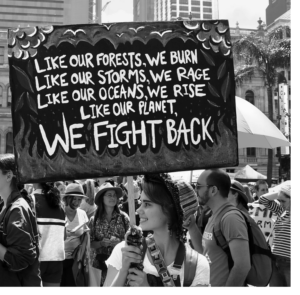
School Strike, Brisbane Australia 2019 >>>>>>>>>>>>>
HOW TO GET A LOOK AT THIS BOOK
You can download the e-book free here. But I recommend buying a copy to help support the author, and because this book makes you stop and think so much, that a copy for your bedside table is a good idea.
SEE ALSO this 2017 paper by Blanche Verlie “Rethinking Climate Education: Climate as Entanglement.” in Educational Studies 53, no. 6. AND Verlie, Blanche. “Bearing Worlds: Learning to Live-with Climate Change.” Environmental Education Research 25, no. 5 (2019)
==============================================
My thanks to listener Steve who suggested this guest. Thank you for listening again this week, and please donate to help Radio Ecoshock keep going.
Alex
Pingback: Radio Adelaide » Learning to Live with Climate Change
young people had better come up with a Plan B soon, or there is not going to be a future for them, because every state, regime and government around the World is de facto in denial, every so called Leader is actually running from climate change, doubling down on business as usual.